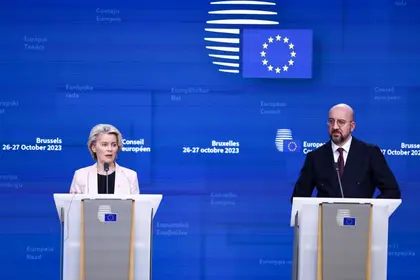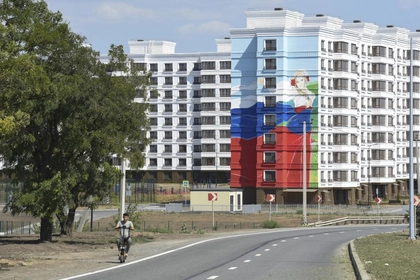EU leaders meeting in Brussels Friday, Oct. 27, discussed bolstering support for Ukraine, as they strived to focus on helping that country against Russia's invasion even as Middle East turmoil steals global attention.
The discussion on Ukraine was taking place on the second day of the summit, after the first day was dominated by coming up with a unified European Union position on the Israel-Hamas war.
JOIN US ON TELEGRAM
Follow our coverage of the war on the @Kyivpost_official.
"It's really important that one of the outcomes of this meeting is that we don't lose focus on Ukraine because of all the other things that are happening in the world and not least in the Middle East," Irish Prime Minister Leo Varadkar said on arrival.
"It would be very easy to lose focus on the war in Ukraine and essential that we don't do that," he said.
After hours of wrangling, the leaders late Thursday issued a demand for "humanitarian corridors and pauses" so aid can get into Gaza and for access to trapped civilians there, including hundreds of EU passport holders.
While all EU countries strongly condemn the October 7 attack by Hamas that triggered the latest, unprecedented conflict, divisions needed to be bridged between some member states that staunchly back Israel's military action and others urging protection for Palestinian civilians afforded under international law.
Israel has been bombarding the Palestinian territory since Hamas gunmen stormed across the border, killing 1,400 people, mostly civilians, and kidnapping more than 220 others, according to Israeli officials.

Azerbaijan-Brokered Deal to Keep Gas Flowing to EU via Ukraine Fails
So far, Gaza's Hamas-run health ministry says the strikes have killed more than 7,000 people, mostly civilians and many of them children, raising growing calls for protection of innocent people caught in the conflict.
Discussion on Ukraine, which has been a top agenda item for EU summits since Russia invaded in February last year, was mostly pushed into Friday, even though Ukrainian President Volodymyr Zelensky called in during Thursday's session.
Zelensky said he supported the EU's efforts to try to prevent the Israel-Hamas confrontation spiralling into a wider Middle East conflagration, warning that "enemies of freedom are very interested in bringing the free world to the second front".
A Spanish proposal for a Middle East peace conference to take place "soon" was also backed by the EU leaders.
"We are all aware that this situation is extremely dangerous for the region and for the world, and that's why we are so active to try to avoid facing a regional escalation," European Council President Charles Michel said as he arrived Friday.
He said the most important point for the second day of the summit was Ukraine, with discussion on how "we develop more support for Ukraine and that we maintain and even we reinforce the pressure against Russia through our sanctions".
- EU budget -
A key EU measure is a plan, tentatively estimated at 20 billion euros ($21 billion) over four years, for a defence fund for Ukraine as part of broader Western security commitments.
Further financial support for Ukraine is backed by almost all 27 EU countries, with only Hungary and Slovakia baulking.
But that is wrapped up in much bigger negotiations over the bloc's next longterm budget, which is shaping up to be a major issue of contention for the next summit scheduled for December.
So-called "frugal" countries led by Germany are urging discipline on spending, recommending extra spending for Ukraine and other priorities such as migration come from reallocating existing funds.
But others say additional money needs to be raised because of accumulating crises at a time of slowing economic growth in the EU.
"I think we are far from agreement," observed Estonian Prime Minister Kaja Kallas.
"The debate on this will still be a long one and the budget debates are always the most challenging," agreed Slovenian counterpart Robert Golob.
Paschal Donohoe, the chair of monthly informal eurozone finance ministerial meetings known as the Eurogroup, said as he arrived for Friday's summit: "Clearly the world is changing at the moment. Economies are beginning to change, they are beginning to slow down."
You can also highlight the text and press Ctrl + Enter






